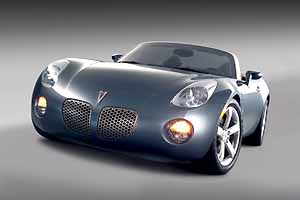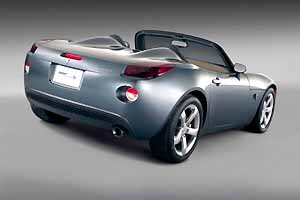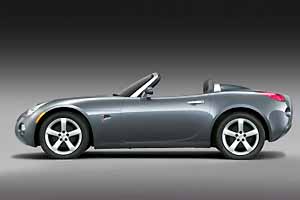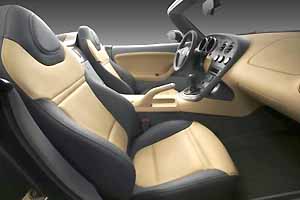

Clean lines,
clever details |
SOLSTICE ADDS NEW DIMENSION TO PONTIAC’S
PERFORMANCE RENAISSANCE
DETROIT - Bringing
the popular concept car to life, GM announced production of the Pontiac Solstice
roadster as a 2006 model.
 The vehicle is expected
in dealer showrooms in fall 2005. First shown as a concept at the 2002 North
American International Auto Show (NAIAS) in Detroit, the Solstice immediately
gained a huge following, both inside and outside of General Motors. Designed
from the ground up in less than four months, the 2002 Solstice concept car
promised thrilling, open-air driving freedom in the spirit of the great roadsters
of the past. Built on GM’s new Kappa architecture, the production model
remains true to the original Solstice concept, including rear-wheel drive,
two-passenger seating and a reverse hinged clamshell hood that opens to reveal
a sophisticated double overhead cam variable-valve four-cylinder engine.
“True to the thinking behind the original concept, the production Solstice
is all about being a ‘back-to-basics’ roadster with gorgeous lines
and fun-to-drive characteristics,” said Bob Lutz, GM vice chairman of
product development and chairman of GM North America. “The key enabler
of Solstice is the new Kappa rear-wheel-drive architecture and component
set, which allows us to rapidly and efficiently develop an appealing family
of compact and affordable sports cars.” The vehicle is expected
in dealer showrooms in fall 2005. First shown as a concept at the 2002 North
American International Auto Show (NAIAS) in Detroit, the Solstice immediately
gained a huge following, both inside and outside of General Motors. Designed
from the ground up in less than four months, the 2002 Solstice concept car
promised thrilling, open-air driving freedom in the spirit of the great roadsters
of the past. Built on GM’s new Kappa architecture, the production model
remains true to the original Solstice concept, including rear-wheel drive,
two-passenger seating and a reverse hinged clamshell hood that opens to reveal
a sophisticated double overhead cam variable-valve four-cylinder engine.
“True to the thinking behind the original concept, the production Solstice
is all about being a ‘back-to-basics’ roadster with gorgeous lines
and fun-to-drive characteristics,” said Bob Lutz, GM vice chairman of
product development and chairman of GM North America. “The key enabler
of Solstice is the new Kappa rear-wheel-drive architecture and component
set, which allows us to rapidly and efficiently develop an appealing family
of compact and affordable sports cars.” |
Emotional design,
rigid backbone
 Strong response
to the 2002 Solstice concept vehicle helped put the sports car on the fast
track to production. But while the concept was designed with production-style
elements, there was no compact rear-wheel-drive platform at GM on which to
build it. Creating a production version of the concept vehicle required marrying
the Solstice’s curvaceous design to an entirely new performance body-chassis
architecture. The robust Kappa architecture features state-of-the-art,
full-length hydroformed frame rails and a stamped steel structural tunnel
to provide a solid structure to enhance vehicle handling. To ensure an
affordable, world-class driving experience, Solstice was created with a clever
blend of all-new technology and proven GM components. Solstice’s power
is created by a new 2.4-liter variable-valve version of the Ecotec DOHC
four-cylinder engine, producing about 170 horsepower. Its twin-cam, multi-valve
design provides stirring, high-revving performance, while the engine’s
lightweight, all-aluminum construction helps optimize the vehicle’s
front-to-rear balance. At the start of production, Solstice will be offered
with a close-ratio Aisin five-speed manual transmission. Strong response
to the 2002 Solstice concept vehicle helped put the sports car on the fast
track to production. But while the concept was designed with production-style
elements, there was no compact rear-wheel-drive platform at GM on which to
build it. Creating a production version of the concept vehicle required marrying
the Solstice’s curvaceous design to an entirely new performance body-chassis
architecture. The robust Kappa architecture features state-of-the-art,
full-length hydroformed frame rails and a stamped steel structural tunnel
to provide a solid structure to enhance vehicle handling. To ensure an
affordable, world-class driving experience, Solstice was created with a clever
blend of all-new technology and proven GM components. Solstice’s power
is created by a new 2.4-liter variable-valve version of the Ecotec DOHC
four-cylinder engine, producing about 170 horsepower. Its twin-cam, multi-valve
design provides stirring, high-revving performance, while the engine’s
lightweight, all-aluminum construction helps optimize the vehicle’s
front-to-rear balance. At the start of production, Solstice will be offered
with a close-ratio Aisin five-speed manual transmission. |
 “With the concept vehicle, people immediately
felt the emotional appeal of Solstice’s design and back-to-basics philosophy
- it’s about performance, but in a fun, agile, affordable roadster,”
said Lynn Myers, Pontiac-GMC general manager. “All the stops were pulled
out to make sure the production model delivers an exhilarating driving experience
to capitalize on the ‘promise’ of the Solstice’s design.”
Faithfulness to the concept can be seen in Solstice’s proportions, which
are comparable in terms of overhangs, wheelbase and track width. Independent
front and rear suspensions that feature independent SLA designs with forged
aluminum upper and lower control arms contribute to responsive handling.
Monotube shock absorbers and coil springs contribute to uncompromised handling
response and sporty driving characteristics while the wheels-at-the-corners
wide stance enhances handling. Eighteen-inch wheels and tires are standard,
as are four-wheel disc brakes. “With the concept vehicle, people immediately
felt the emotional appeal of Solstice’s design and back-to-basics philosophy
- it’s about performance, but in a fun, agile, affordable roadster,”
said Lynn Myers, Pontiac-GMC general manager. “All the stops were pulled
out to make sure the production model delivers an exhilarating driving experience
to capitalize on the ‘promise’ of the Solstice’s design.”
Faithfulness to the concept can be seen in Solstice’s proportions, which
are comparable in terms of overhangs, wheelbase and track width. Independent
front and rear suspensions that feature independent SLA designs with forged
aluminum upper and lower control arms contribute to responsive handling.
Monotube shock absorbers and coil springs contribute to uncompromised handling
response and sporty driving characteristics while the wheels-at-the-corners
wide stance enhances handling. Eighteen-inch wheels and tires are standard,
as are four-wheel disc brakes.
The interior is oriented around the driver, with a clean design and intuitive
controls. “The interior of the Solstice is surprisingly spacious, especially
for a smaller car,” said Lori Queen, vehicle line executive for GM’s
small cars. “We wanted to create a comfortable environment suitable
for longer drives without sacrificing the ‘personal’ feeling of
a driver’s car.”
Clean lines,
clever details
 Designers worked carefully to transfer the
clean lines and taut proportions of the concept vehicle to the production
model. “Put them side by side and it’s very difficult to tell the
production model from the concept,” said Franz Von Holzhausen, design
manager. “The front and rear fascias are slightly longer on the production
model, but overall the car remains faithful to the concept - it’s a
minimalist approach that emphasizes proportion.” The Solstice’s
proportions are accented with five-spoke wheels and a low, wide stance. A
dual-port grille and expressive lighting at all corners instantly identifies
the car as a Pontiac. Unexpected details include a body-color extension into
the passenger compartment that gives the Solstice an integrated appearance
when the top is down. In fact, the top folds flat into the rear clamshell
opening, providing a smooth seamless appearance. “There is no visible
stack from the folded top to disturb the shape,” said Von Holzhausen.
“In fact, there are no extraneous lines whatsoever; it has a tight,
purposeful look, as if it were shrink-wrapped around the driver.” Designers worked carefully to transfer the
clean lines and taut proportions of the concept vehicle to the production
model. “Put them side by side and it’s very difficult to tell the
production model from the concept,” said Franz Von Holzhausen, design
manager. “The front and rear fascias are slightly longer on the production
model, but overall the car remains faithful to the concept - it’s a
minimalist approach that emphasizes proportion.” The Solstice’s
proportions are accented with five-spoke wheels and a low, wide stance. A
dual-port grille and expressive lighting at all corners instantly identifies
the car as a Pontiac. Unexpected details include a body-color extension into
the passenger compartment that gives the Solstice an integrated appearance
when the top is down. In fact, the top folds flat into the rear clamshell
opening, providing a smooth seamless appearance. “There is no visible
stack from the folded top to disturb the shape,” said Von Holzhausen.
“In fact, there are no extraneous lines whatsoever; it has a tight,
purposeful look, as if it were shrink-wrapped around the driver.” |
“We insisted on a lower ride height to ensure the car’s sporty
appearance,” said Von Holzhausen. “That makes it the lowest, most
ground-hugging car at GM. We were adamant that the Solstice look absolutely
right from all angles.” Creative leveraging of GM resources, as well
as clever solutions to other needs, helped complete the Solstice’s design
efficiently and economically. For example, the rear corner lamps are from
the GMC Envoy, while door handles, fog lamps, seats, engine and transmission
are shared with other GM vehicles. However, some parts are all Solstice.
The taillamps, for instance, were designed with special reflectors to eliminate
the need for a separate side marker light. This not only contributes to the
car’s sleek design, but also eliminates the cost of a separate marker
lens and bulb.
 Interior design is equally purposeful and clever,
with details like pedals placed for easy heel-and-toe driving and a cockpit-style
instrument panel that sweeps around the driver. Designers also worked with
chassis engineers to optimize the placement of the shifter. Manual shifter
throws between gear changes were studied and shortened. “When you sit
down in the car, your hand naturally falls onto the shifter,” said Vicki
Vlachakis, interior designer. “It’s a very intuitive, comfortable
environment, and the feel of the shifter between gears is very short and
precise. Designers and chassis engineers worked together to tune the best
placement.” Interior design is equally purposeful and clever,
with details like pedals placed for easy heel-and-toe driving and a cockpit-style
instrument panel that sweeps around the driver. Designers also worked with
chassis engineers to optimize the placement of the shifter. Manual shifter
throws between gear changes were studied and shortened. “When you sit
down in the car, your hand naturally falls onto the shifter,” said Vicki
Vlachakis, interior designer. “It’s a very intuitive, comfortable
environment, and the feel of the shifter between gears is very short and
precise. Designers and chassis engineers worked together to tune the best
placement.” |
A turning
point
The production Solstice announcement further enhances a re-energized Pontiac
lineup that already includes the all-new GTO and G6, Grand Prix, Vibe and
a V-8-powered Bonneville GXP. “Solstice is a vehicle that captures the
passion and pleasure of open-air driving,” said Myers. “Everyone
at GM recognized that adding it to Pontiac’s portfolio would make another
strong statement about Pontiac’s renaissance.” Its fast-track approval
and development process come on the heels of a similar rapid decision process
that helped launch the 2004 GTO in 18 months. “The GTO and Solstice
complement each other by offering ‘book-end’ approaches to
Pontiac’s performance offerings,” said Myers. “Like its V-8
powered stable mate, Solstice adds another dimension to a growing lineup
of clean, uncompromising performance vehicles.”
2006 PONTIAC
SOLSTICE PRELIMINARY SPECIFICATIONS
General
Body/chassis structure: spaceframe
Body material: hydroform/stamped steel
Chassis material: aluminum/steel
Suspension
Front: SLA w/coil-over, monotube shock
Rear: SLA w/coil-over, monotube shock
Wheels (in): 18 x 8.5 aluminum
Tires
Front: P245/45R18
Rear: P245/45R18
Tire brand: Goodyear
Brakes: 4-wheel disc w/ ABS option
Dimensions
Height (in / mm): 50.2 / 1274
Length (in / mm): 157.2 / 3994
Width (in / mm): 71.6 / 1819
Wheelbase (in / mm): 95.1 / 2415
Track (in / mm)
Front: 60.5 / 1537
Rear: 61.2 / 1555
Weight (lb / kg): 2860 / 1300 (estimated)
Powertrain
Engine: 2.4L DOHC I-4 Ecotec (LE5)
Displacement (cu in / cc): 145 / 2400
Horsepower (hp / kw) @ rpm: 170 / 127 @ 6400
Torque (lb-ft / Nm) @ rpm: 170 / 230 @ 4400
Transmission: MW5 Aisin 5-spd manual
READER COMMENTS

| Pontiac-GMC Communications,
January 04, 2004 |
BACK TO TOP |